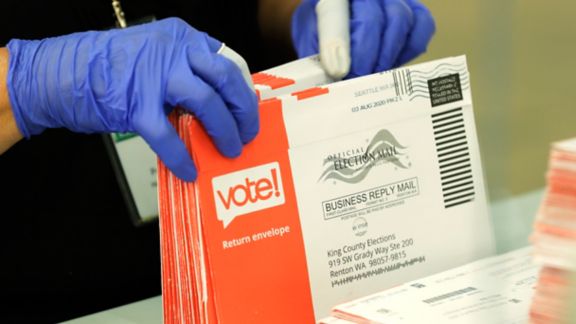Spotlighting Asian American, Native Hawaiian & Pacific Islander Views in New Survey Series

This article is from our NORC Now newsletter. Subscribe today.
August 2024
Policymakers and others finally have rigorous, critical data on AAPI communities.
Language, infrastructure, and other barriers have historically made it difficult to poll AAPI communities*, including Asian Americans, Native Hawaiians, and Pacific Islanders. This meant that policymakers and others often didn’t hear AAPI voices because they were underrepresented in public opinion surveys. NORC’s new AAPI Data/AP-NORC survey series rectifies this situation. Developed and executed as a partnership between The Associated Press-NORC Center for Public Affairs Research and AAPI Data, the AAPI survey series combines deep research, journalism, and cultural awareness capabilities with existing AAPI relationships.
“Our unique collaboration allows us to mine the perspectives of culturally and linguistically diverse AAPI populations with the utmost efficacy and sensitivity,” said Jennifer Benz, a vice president in NORC’s Public Affairs & Media Research department and deputy director of The Associated Press-NORC Center for Public Affairs Research. “What further sets our efforts apart is that our surveys use NORC’s Amplify AAPI® panel to question participants in their preferred languages.”
Amplify AAPI gives voice to linguistically diverse AAPI communities by using multiple languages.
While most panels and public opinion surveys are recruited for and conducted only in English and Spanish, Amplify AAPI can interview respondents in Korean, Vietnamese, two Chinese dialects, and English. Amplify AAPI worked with community organizations—including AAPI Data and The Asian American Foundation—to use probability-based sampling methods to recruit panelists who represent broad linguistic, generational, and cultural diversity.
The panel currently supports a maximum of 3,000 online and phone interviews but is expected to grow to include 6,000 to 7,000 people within the next two years. This expansion will bring with it new languages.
Our monthly AAPI Data/AP-NORC surveys reveal the depth and complexity of the AAPI experience in America.
In January 2024, we used Amplify AAPI’s mix of languages to ask Asian American, Native Hawaiian, and Pacific Islander adults to identify their key issues in 2024. They flagged the economy and foreign policy—particularly inflation and immigration—as top concerns. Education, the environment, health care, and public safety are also important. This range of priorities reflects the complexity of the AAPI experience in America.
“Mirroring the general population, we found that generational and political differences play important roles in shaping AAPI priorities,” said Benz. “Our insights might prove particularly useful to policymakers in an election year, especially regarding which issues are important to AAPI youth.”
For example, we found that AAPI adults under 30 are more likely to prioritize health care reform, student debt, housing costs, and the Israel-Palestine conflict than those aged 65 and older. However, older AAPI adults, particularly those 65+, prioritize immigration more than 18- to 29-year-olds.
The survey series covers a range of issues. For example, when it comes to climate change, 84 percent of AAPI respondents overall believe in it, and the majority—even AAPI Republicans (52 percent)—believe it is the result of human activity. In fact, more AAPI Republicans believe climate change is human-driven than their Republican counterparts in the general population (31 percent).
Another hot-button electoral issue is abortion. One of our surveys found that 79 percent of AAPI respondents support legalizing abortion in all or most cases; 75 percent want Congress to pass a law guaranteeing access nationwide. Most AAPI adults (68 percent) also said that they wouldn’t vote for a candidate who doesn’t share their views on abortion.
Regarding education, our sixth survey (April 2024) revealed that 71 percent of AAPI communities believe that slavery, racism, segregation, and AAPI history should be taught in K-12 schools. Interestingly, while 51 percent say that advancing equity and inclusion should be an educational priority, only 18 percent thought that race or ethnicity should be used in college admissions.
The media is hungry for scientifically rigorous AAPI data.
Many media outlets—including The New York Times, Los Angeles Times, The Hill, Axios, Forbes, NBC, and Yahoo News—have reported on our surveys, some on multiple occasions. This coverage helps replace anecdotal evidence and stereotyping with the hard facts needed to paint a fuller, more accurate picture of AAPI communities.
“We intend to continue providing decision-makers and other stakeholders with in-depth data to better understand and meet the needs of AAPI communities,” said Benz.
* Why NORC uses “AAPI communities”
The language that describes Asian American, Native Hawaiian, and Pacific Islander communities is constantly evolving. As evidence, NORC created the Amplify AAPI panel when “AAPI” was a generally accepted standard, and we work with clients who have AAPI in their names. To avoid the confusion of using different acronyms to refer to the same groups of people while still attempting to remain as inclusive as possible, we are choosing, for now, to use “AAPI communities” to refer to the broad diversity of Asian Americans, Native Hawaiians, and Pacific Islander in the United States.
This article is from our flagship newsletter, NORC Now. NORC Now keeps you informed of the full breadth of NORC’s work, the questions we help our clients answer, and the issues we help them address.








